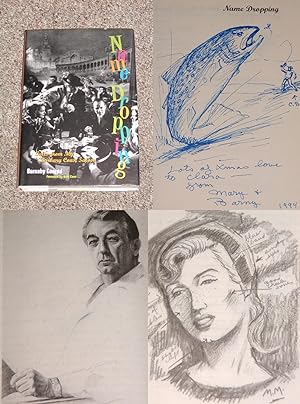Synopsis
Part saloon, part salon, Barnaby Conrad's El Matador was nestled in the heart of San Francisco's cabaret and nightlife district. There, within the space of a few blocks of North Beach's Barbary Coast, one could catch Johnny Mathis singing at Ann's 440 Club, cross the street to the Swiss American Hotel where Lenny Bruce once thought he was a bird and attempted to fly out of a second-story window, and walk a couple of blocks to the Hungry i to check out newcomers like Mike Nichols and Elaine May, Woody Allen, Bill Cosby, Barbra Streisand, and the Smothers Brothers. Still, despite the accumulation of dozens of bars, restaurants, and night spots, the area lacked "a truly chic and comfortable [club], a place where attractive and interesting people could congregate over a martini."
Conrad's El Matador stylishly filled the void. On any given night, one might find Noel Coward, Marilyn Monroe, Truman Capote, Frank Sinatra, Ava Gardner, or Tyrone Power in the club, or hear Duke Ellington, Art Tatum, Eva Gabor, George Shearing, or Andre Previn take over the piano.
In Name Dropping, Barnaby Conrad vibrantly evokes this bygone era. Charming, personable, and witty, the author is both celebrity and fan as he shares vivid, hilarious, and surprising anecdotes, delightfully dropping famous names all the while.
Reviews
Conrad (Time Is All We Have, 1986) tries in vain to recapture the heady days at the San Francisco bar he opened in 1953 with the proceeds from his best-selling novel, Matador. Certainly, the era's jet set passed through El Matador's doors, but the stories Conrad tells about them range from dull to just plain silly. Jack Kerouac once sat at the bar and tried to repeat ``Freud's a fraud'' three times fast. Truman Capote tamed a ferocious bulldog by cradling it in his arms and murmuring ``Bulldog, bulldog.'' Lines or hijinks that might have seemed fresh at the time are now as stale as old crackers. John Ireland's joking response to the rumor that he was ``one of the ten best-endowed men in the world'' barely provokes a smile. And Ava Gardner's pouring a drink down a waiter's pants at Horcher's in Madrid is no longer the shockingly salacious act it must have been in its day. The only endearing factor here is democratic treatment; Conrad blithely reveals the foibles of the rich and famous, mostly the excessive drinking habits of people like Bing Crosby. (It is more than ironic that Conrad, whose last book was a memoir of his stint at the Betty Ford Center, tries to wring humor from drunken behavior.) In his introduction, Conrad mentions that he opened his bar with a Casablanca-like fantasy of meeting the woman of his dreams, even though he was married at the time; he ends with the story of ``The Girl'' who finally fulfilled the fantasy. Aside from these two references, the book follows no discernible logical path of organization, chronological or otherwise; it leaps from one banal reminiscence to the next. A breathless tone that is alternately society-page and frat-boy influenced (on Marilyn Monroe learning a dance step: ``When Marilyn bounced, everything bounced'') does not help matters. About as entertaining as a hangover. (12 line drawings, not seen) -- Copyright ©1994, Kirkus Associates, LP. All rights reserved.
It's refreshing to find a book whose title accurately conveys its contents. In delightfully witty style, Conrad ushers us into the world of his hip 1950s literary salon, the Barbary Coast Saloon. Guest stars include authors, singers, musicians, and actors too numerous to mention but all of them popular culture luminaries and icons. The sections on Alex Haley and Bing Crosby--to drop just a couple of the names Conrad does--are incredibly juicy both for tidbits of gossip and for what they reveal about two well-known media stars. Never catty, just damned informative throughout, this is one well-crafted, entertaining little volume, the kind of thing that shows what gossip can be in the hands of an artist. Mike Tribby
Diplomat, bullfighter, writer, artist, saloon keeper, Conrad has led a colorful life. This aptly titled memoir contains anecdotes about well-known friends and acquaintances, including Bing Crosby, Truman Capote, David Niven, Lucille Ball, and Sinclair Lewis. Many of the stories recount evenings at El Matador, the San Francisco carbaret Conrad opened with the proceeds from his best-selling novel Matador (1952). In keeping with the saloon's taurine motif, Conrad includes portraits of renowned bullfighters Manolete and Juan Belmonte. When Conrad pokes fun at his subjects, his thrust is usually gentle. An unflattering portrait of Trader Vic is an exception. Gossipy memoirs on celebrities abound, but Conrad's book is cut above the rest.
William Gargan, Brooklyn Coll. Lib.,
Copyright 1994 Reed Business Information, Inc.
"About this title" may belong to another edition of this title.
